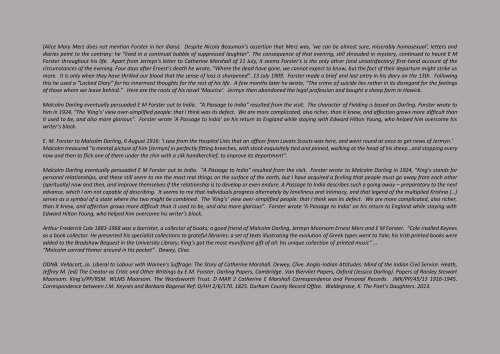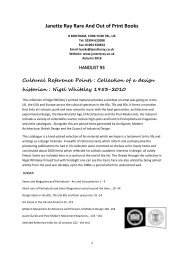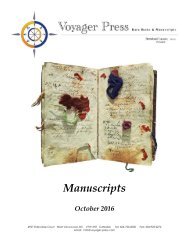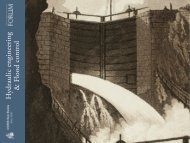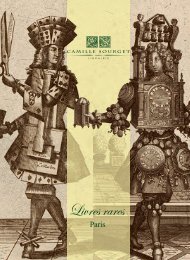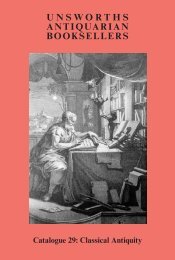CALVERT-STANGER-MOORSOM LIBRARY
1l1WlAO
1l1WlAO
Create successful ePaper yourself
Turn your PDF publications into a flip-book with our unique Google optimized e-Paper software.
(Alice Mary Merz does not mention Forster in her diary). Despite Nicola Beauman’s assertion that Merz was, 'we can be almost sure, miserably homosexual', letters and<br />
diaries point to the contrary: he “lived in a continual bubble of suppressed laughter”. The consequence of that evening, still shrouded in mystery, continued to haunt E M<br />
Forster throughout his life. Apart from Jermyn’s letter to Catherine Marshall of 11 July, it seems Forster’s is the only other (and unsatisfactory) first-hand account of the<br />
circumstances of the evening. Four days after Ernest’s death he wrote, “Where the dead have gone, we cannot expect to know, but the fact of their departure might strike us<br />
more. It is only when they have thrilled our blood that the sense of loss is sharpened”. 13 July 1909. Forster made a brief and last entry in his diary on the 13th. Following<br />
this he used a “Locked Diary” for his innermost thoughts for the rest of his life. A few months later he wrote, “The crime of suicide lies rather in its disregard for the feelings<br />
of those whom we leave behind.” Here are the roots of his novel ‘Maurice’. Jermyn then abandoned the legal profession and bought a sheep farm in Hawick.<br />
Malcolm Darling eventually persuaded E M Forster out to India. “A Passage to India” resulted from the visit. The character of Fielding is based on Darling. Forster wrote to<br />
him in 1924, “The ‘King’s’ view over-simplified people: that I think was its defect. We are more complicated, also richer, than it knew, and affection grows more difficult than<br />
it used to be, and also more glorious”. Forster wrote ‘A Passage to India’ on his return to England while staying with Edward Hilton Young, who helped him overcome his<br />
writer’s block.<br />
E. M. Forster to Malcolm Darling, 6 August 1916: 'I saw from the Hospital Lists that an officer from Lovats Scouts was here, and went round at once to get news of Jermyn.’<br />
Malcolm treasured “a mental picture of him [Jermyn] in perfectly fitting breeches, with stock exquisitely tied and pinned, walking at the head of his sheep…and stopping every<br />
now and then to flick one of them under the chin with a silk handkerchief, to improve its deportment”.<br />
Malcolm Darling eventually persuaded E M Forster out to India. “A Passage to India” resulted from the visit. Forster wrote to Malcolm Darling in 1924, “King’s stands for<br />
personal relationships, and these still seem to me the most real things on the surface of the earth, but I have acquired a feeling that people must go away from each other<br />
(spiritually) now and then, and improve themselves if the relationship is to develop or even endure. A Passage to India describes such a going away – preparatory to the next<br />
advance, which I am not capable of describing. It seems to me that individuals progress alternately by loneliness and intimacy, and that legend of the multiplied Krishna (…)<br />
serves as a symbol of a state where the two might be combined. The ‘King’s’ view over-simplified people: that I think was its defect. We are more complicated, also richer,<br />
than it knew, and affection grows more difficult than it used to be, and also more glorious”. Forster wrote ‘A Passage to India’ on his return to England while staying with<br />
Edward Hilton Young, who helped him overcome his writer’s block.<br />
Arthur Frederick Cole 1883-1968 was a barrister, a collector of books; a good friend of Malcolm Darling, Jermyn Moorsom Ernest Merz and E M Forster. “Cole rivalled Keynes<br />
as a book collector. He presented his specialist collections to grateful libraries: a set of texts illustrating the evolution of Greek types went to Yale; his Irish printed books were<br />
added to the Bradshaw Bequest in the University Library; King’s got the most munificent gift of all: his unique collection of printed music” ...<br />
“Malcolm carried Homer around in his pocket”. Dewey, Clive.<br />
ODNB. Vellacott, Jo. Liberal to Labour with Women's Suffrage: The Story of Catherine Marshall. Dewey, Clive. Anglo-Indian Attitudes: Mind of the Indian Civil Service. Heath,<br />
Jeffrey M. (ed) The Creator as Critic and Other Writings by E.M. Forster. Darling Papers, Cambridge. Van Biervliet Papers, Oxford (Jessica Darling). Papers of Raisley Stewart<br />
Moorsom. King's/PP/RSM. WLMS Moorsom. The Wordsworth Trust. D MAR 2 Catherine E Marshall Correspondence and Personal Records. JMK/PP/45/13 1916-1945.<br />
Correspondence between J.M. Keynes and Barbara Bagenal Ref: D/HH 2/6/170. 1825. Durham County Record Office. Waldegrave, K. The Poet’s Daughters. 2013.


